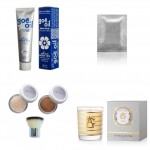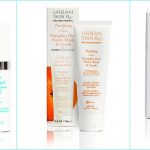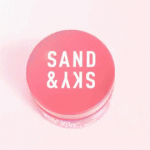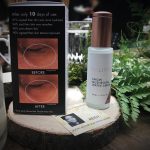In this installment of Skinterrogation, Dr. Valerie Goldburt discusses acne, both facial and body, with us. Dr. Goldburt is an alumna of both Harvard and Columbia, receiving her Bachelors then Masters (respectively) before attended medical school. The New York-based dermatologist is also a host for the radio show “Love my Skin.” She’s consulted with top beauty brands and now is working with Dial to launch their brand new Dial Acne Control line. Here, I caught up with her to glean her best body acne avoidance tips, supplement recommendations and more.
Rouge18: What are some easy tips for addressing body acne?
Dr. Goldburt: Body acne tends to pop up in people who make a lot of oil, sweat a lot, or both. That’s because oil combined with sweat can clog pores. I see this in people who are physically active or work out. It’s really important to wash off as soon as you’ve done any activity that’s made you sweat. Salicylic acid body washes are great for keeping those pores clean and keeping the body acne in check.
R18: Is workout clothing a potential culprit?
VG: Yes, most definitely. Clothing that traps sweat can cause breakouts. I see a lot more upper back acne, for instance, than I do lower back acne. I think that’s because most clothing sticks at the top. Also, skin is sensitive to clothing that chafes; that can increase oil production and acne. Try to wear sweat-wicking clothing that doesn’t chafe.
R18: Would you recommend exfoliating regularly if we have body acne?
VG: Ideally, you want to exfoliate once a week. Practically, though, it’s really tricky exfoliating the back. Also, people with acne tend to overdo the scrubbing and that can actually trigger more acne to form. So, choose something non-abrasive, like a pouf, and wash gently with cleanser in the shower every day. I love the new Dial Acne Control products. There’s a soap bar and there are two types of washes – one for the body and one for the face. I’m a big fan of soap so that one is my favorite, but a lot of my patients prefer liquid soaps and cleansers so Dial made something for everyone. This product has salicylic acid as the main ingredient and it isn’t too drying, which is important.
R18: Will body lotion help, exacerbate worsen or not have no effect on acne?
VG: It depends on the body lotion. The problem with some of them is that there are fragrances, preservatives and other ingredients that actually make acne worse. I usually tell my patients to stop using all lotions until their acne clears up.
R18: What about facial acne – any skin-care tips you can share?
VG: My tips for face are similar to those for the body. Stop all lotions until your face clears up. Use a gentle cleanser, like Dial Acne Control Face Bar or Wash, twice a day for active breakouts. Exfoliate gently with a scrub once a week. I like an apricot scrub; Jason makes a super gentle one. And keep your face moisturized. This may seem counterintuitive, but oil works really well on the face! I recommend argan oil once a day. Josie Maran makes a nice one.
R18: How about nutritionwise, anything you’ve found that helps?
VG: Try to cut down on processed foods and sugars; it turns out these foods actually CAN break you out! Dairy also. And this may seem really basic, but when you’re breaking out, you have to go back to basics – you need to stay well-hydrated. You should drink one half your body weight in fluid ounces of water daily to keep your complexion clear. So, for instance, if you weigh 140 pounds, you should drink 70 ounces of water a day, and more if you’re physically active.
R18: If we must pop a zit (it happens), what is the best course of action to help the area heal?
VG: First of all, it should be a zit that is pop-able. You should only pop whiteheads, meaning there’s a little white bump at the top. If it’s a blackhead or if it’s a red bump, you shouldn’t touch it because that can cause scars. Clean the area with anti-bacterial soap. Then use two Q-tips to squeeze the zit GENTLY. If it doesn’t pop, you might want to see a dermatologist because there are things we can do to make a zit go away quickly. Never use your nails. I used my nails when I was 14 years old and learned the hard way that it can leave permanent scars. After you pop the zit, dab a little topical salicylic acid or benzoyl peroxide gel on it to reduce the inflammation that’s still in there.
R18: What supplements do you recommend?
VG: I think a good multi-vitamin is important because so many of us don’t necessarily eat a well-balanced diet. Magnesium, selenium, and zinc are important to build up good skin. However, you can find a lot of what you need in veggies. I highly recommend getting a juicer, if you don’t have one already, and try juicing with leafy dark greens (spinach and kale), berries, carrots, and bean sprouts to get a ton of the vitamins, minerals, and micronutrients you need for a great complexion.
R18: Any stress management tips you can share?
VG: Acne can be caused by stress, so this is a great question. I saw a patient recently who used to have terrible acne. She had a high-power, stressful job, where she was getting home late every night, and sleeping and eating poorly. She came in the other day, saying she lost 25 pounds the past 3 months because she had started exercising and eating better. But what was really interesting is that her acne had almost completely cleared up and she didn’t need her acne medications anymore. She was doing yoga, cross fit training, AND she recently started a meditation practice. That’s a lot, but the point is that a stress management process that is consistent can be really helpful for acne breakouts. A study a few years ago showed that even just a few minutes of meditation a day helps with breakouts.
Thanks, Dr. Goldburt!
What do you think? Did you learn something new about acne?
The Skinterrogation column features Q&A seshes with dermatologists, aestheticians and other major movers and shakers in the skin care industry.









There’s more sebum production in the upper back than the lower. This is a more parsimonious model than “sticking clothes”–I mean, we usually don’t have problems with acne in the crotch area. Basing statistical claims on biased clinical anecdata (whom she sees… with no reference to whom she doesn’t!) is a recipe for bad medicine.
I really don’t mean to be trollish. I just don’t like seeing questionable advice spread. I’m a scientist interested in enhancing my looks, and the amount of unsubstantiated “expert” opinion in this business is depressing and deeply exhausting. And FFS, she’s recommending products she’s paid to endorse. Please show some respect.